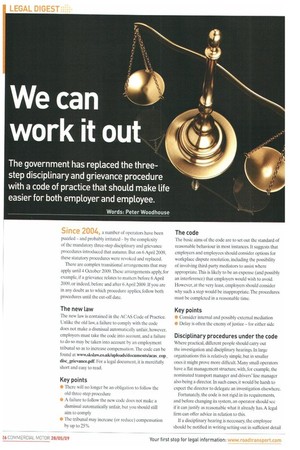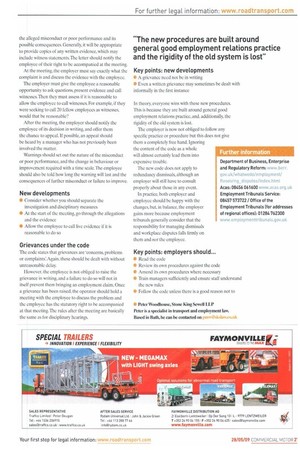We can work it out
Page 26

Page 27

If you've noticed an error in this article please click here to report it so we can fix it.
The government has replaced the threestep disciplinary and grievance procedure with a code of practice that should make life easier for both employer and employee.
Words: Peter Woodhouse
Since 2004, a number of operators have been puzzled — and probably irritated — by the complexity of the mandatory three-step disciplinary and grievance procedures introduced that autumn. But on 6 April 2009, these statutory procedures were revoked and replaced.
There are complex transitional arrangements that may apply until 4 October 2009. These arrangements apply, for example, if a grievance relates to matters before 6 April 2009. or indeed, before and after 6 April 2009. If you are in any doubt as to which procedure applies, follow both procedures until the cut-off date.
The new law The new law is contained in the ACAS Code of Practice. Unlike the old law, a failure to comply with the code does not make a dismissal automatically unfair, however. employers must take the code into account, and a failure to do so may be taken into account by an employment tribunal so as to increase compensation. The code can be found at www.skslaw.co.uk/uploads/documents/acas_cop_ disc_grievance.pdt For a legal document, it is mercifully short and easy to read.
Key points There will no longer he an obligation to follow the old three-step procedure • A failure to follow the new code does not make a dismissal automatically unfair, but you should still aim to comply • The tribunal may increase (or reduce) compensation by up to 25% The code The basic aims of the code are to set out the standard of reasonable behaviour in most instances. It suggests that employers and employees should consider options for workplace dispute resolution, including the possibility of involving third-party mediators to assist where appropriate. This is likely to be an expense (and possibly an interference) that employers would wish to avoid. However, at the very least, employers should consider why such a step would be inappropriate. The procedures must be completed in a reasonable time.
Key points • Consider internal and possibly external mediation • Delay is often the enemy of justice —for either side Disciplinary procedures under the code Where practical, different people should carry out the investigation and disciplinary hearings. In large organisations this is relatively simple, but in smaller ones it might prove more difficult. Many small operators have a flat management structure, with, for example, the nominated transport manager and drivers' line manager also being a director, In such cases, it would be harsh to expect the director to delegate an investigation elsewhere.
Fortunately, the code is not rigid in its requirements, and before changing its system, an operator should see if it can justify as reasonable what it already has. A legal firm can offer advice in relation to this.
If a disciplinary hearing is necessary the employee should be notified in writing setting out in sufficient detail the alleged misconduct or poor performance and its possible consequences. Cienerally, it will be appropriate to provide copies of any written evidence, which may include witness statements. The letter should notify the employee of their right to be accompanied at the meeting.
At the meeting, the employer must say exactly what the complaint is and discuss the evidence with the employee.
The employer must give the employee a reasonable opportunity to ask questions, present evidence and call witnesses. Then they must assess if it is reasonable to allow the employee to call witnesses. For example, if they were seeking to call 20 fellow employees as witnesses, would that be reasonable?
After the meeting, the employer should notify the employee of its decision in writing, and offer them the chance to appeal. If possible, an appeal should be heard by a manager who has not previously been involved the matter.
Warnings should set out the nature of the misconduct or poor performance, and the change in behaviour or improvement required with a time scale. The employee should also be told how long the warning will last and the consequences of further misconduct or failure to improve.
New developments
Consider whether you should separate the investigation and disciplinary measures • At the start of the meeting, go through the allegations and the evidence • Allow the employee to call live evidence if it is reasonable to do so
Grievances under the code
The code states that grievances are 'concerns, problems or complaints:Again, these should be dealt with without unreasonable delay.
However, the employee is not obliged to raise the grievance in writing, and a failure to do so will not in itself prevent them bringing an employment claim. Once a grievance has been raised, the operator should hold a meeting with the employee to discuss the problem and the employee has the statutory right to be accompanied at that meeting. The rules after the meeting are basically the same as for disciplinary hearings.
Key points: new developments
• A grievance need not be in writing • Even a written grievance may sometimes be dealt with informally in the first instance In theory, everyone wins with these new procedures.
This is because they are built around general good employment relations practice, and, additionally, the rigidity of the old system is lost.
The employer is now not obliged to follow any the content of the code as a whole will almost certainly lead them into expensive trouble.
The new code does not apply to redundancy dismissals, although an employer will still have to consult properly about those in any event.
In practice, both employer and employee should be happy with the changes, but, in balance, the employer gains more because employment tribunals generally consider that the responsibility for managing dismissals and workplace disputes falls firmly on them and not the employee.
Key points: employers should...
• Read the code • Review its own procedures against the code • Amend its own procedures where necessary • Train managers sufficiently and ensure staff understand the new rules • Follow the code unless there is a good reason not to
• Peter Woodhouse, Stone King Sewell LEP Peter is a specialist in transport and employment law. Based in Bath, he corn be contacted on pm1,1@skskrowiLlik








































































































































